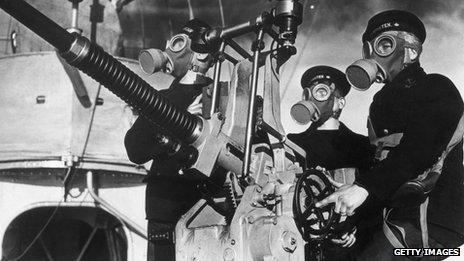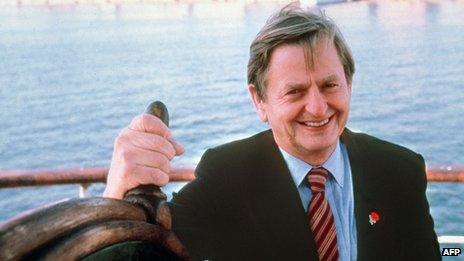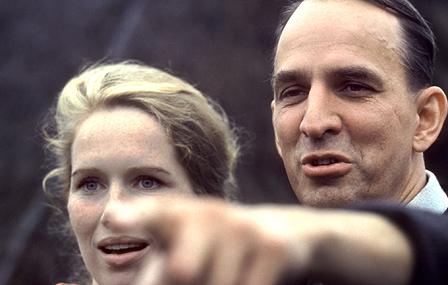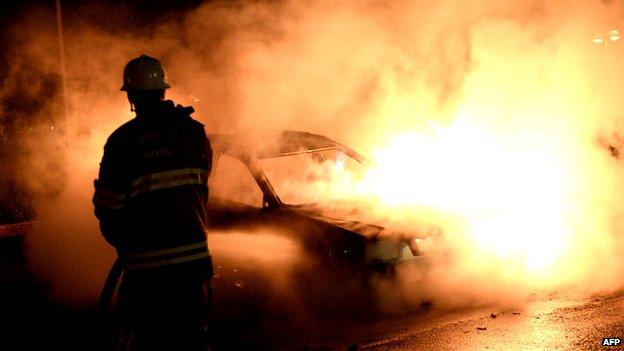Sweden profile - Timeline
- Published
A chronology of key events:
1905 - Union between Sweden and Norway peacefully dissolved, 90 years after Sweden invaded Norway.
1914 - Outbreak of World War I. Sweden remains neutral.
1920 - Sweden joins League of Nations. During the 1920s Sweden develops from an agricultural into an industrial society. Social democratic governments enact various social reforms.

Sweden carefully guarded its neutrality during World War II
1939 - At the outbreak of World War II, Sweden - along with its Scandinavian neighbours - declares its neutrality. Sweden rejects a request from Germany's enemies to use its territory as a transit route for troops.
1940 - Following the German occupation of Denmark and Norway, Sweden is forced by German military superiority to allow German troops to transit through Sweden to Norway. But the Swedish prime minister rebuffs Germany's offer of membership in the "New Order". Sweden becomes a refuge for Danes and Norwegians trying to flee from the Germans.
1943 - Transit agreement with Germany is cancelled.
1946 - Sweden joins the United Nations.
Social Democrat Tage Erlander becomes prime minister and stays in the post until 1969. Successive governments develop a comprehensive welfare state, introducing a national health service in 1955 and a state pension scheme in 1959.
1952 - Sweden becomes founder member of the Nordic Council, established to further the mutual interests of the Scandinavian countries.
1953 - Swedish diplomat Dag Hammarskjoeld becomes secretary-general of the United Nations; he stays in the post until 1961. Sweden contributes troops towards UN peace-keeping missions.

The 1986 killing of Social Democrat Prime Minister Olof Palme remains unsolved
1959 - Sweden becomes founder member of the European Free Trade Association (EFTA).
1971 - The two-chamber parliament is replaced by one chamber elected by proportional representation.
1975 - Further constitutional reforms enacted. The last remaining powers of the monarch are removed, so that his duties become purely ceremonial.
1976 - Centre Party leader Thorbjörn Fälldin becomes prime minister, leading Sweden's first non-socialist government for forty years
A decade of uncertainty
Early 1980s - Relations with the Soviet Union deteriorate when Soviet submarines are suspected of infiltrating Swedish territorial waters.
1986 - Social democrat prime minister Olof Palme is assassinated on a Stockholm street by a gunman who fled the scene. Sweden is plunged into shock, and the conduct of the police investigation prompts public criticism.In June 2020, police conclude that the killer was Stig Engstrom, a troubled man who disliked the prime minister and committed suicide in 2000.

Storybook character Pippi Longstocking is the creation of Swedish writer Astrid Lindgren who revolutionised children's books
1990 - The parliament supports the government's decision to apply for membership of the European Union.
1994 - Swedes narrowly support EU membership in a referendum. Sweden joins the EU on 1st January 1995.
1996 - Social Democrat Goeran Persson becomes prime minister after his party colleague Ingvar Carlsson steps down.
1998 - Following a general election, Persson forms a minority government, supported by the former communists.
2000 July - Official opening of new bridge and tunnel linking Malmo in southern Sweden and Danish capital Copenhagen. The new road and rail link makes it possible to travel between the two countries in just 15 minutes.
2002 September - Following elections, Goerran Persson continues into third consecutive term as prime minister in minority government relying on support from the Left Party and the Greens.
Lindh murder
2003 September - Foreign Minister Anna Lindh dies from stab wounds after being attacked by an assailant in a Stockholm department store.

Ingmar Bergman, right, pictured with Liv Ulmann, is considered as one of the world's most accomplished and influential film directors
Referendum vote goes against joining the single European currency.
2004 March - Man who confessed to killing Anna Lindh on impulse is convicted of her murder. In December, Supreme Court confirms his life imprisonment, overturning a ruling that he should be sent to a psychiatric hospital.
2006 March - Foreign Minister Laila Freivalds resigns amid row over her ministry's involvement in closure of website which had been due to publish controversial cartoons depicting Prophet Mohammad.
2006 September - A centre-right alliance headed by Moderate Party leader Fredrik Reinfeldt wins parliamentary elections, ending 12 years of Social Democrat rule.
2007 July - Renowned Swedish cinema director Ingmar Bergman dies aged 89.
2008 November - Sweden ratifies the EU's Lisbon Treaty, the 24th member to do so.
2009 February - The government reverses a 30-year-old policy of phasing out nuclear power, saying new reactors are needed to fight climate change and secure energy supplies.
2009 July - Sweden takes over rotating presidency of the European Union, with the promise of tackling climate change and combat rising unemployment in Europe.
Far right surge
2010 September - Prime Minister Fredrik Reinfeldt's centre-right coalition falls narrowly short of a majority in parliamentary elections. The anti-immigration Swedish Democrats become the first far right party to win seats in Sweden's parliament.
2010 October - PM Reinfeldt forms new broad minority government.
2010 December - Founder of Wikileaks, Julian Assange, is taken into custody in Britain after Sweden asks for his extradition.
Sweden suffers its first suicide bombing, carried out by 28-year-old Iraqi-born Islamist extremist Taimour Abdulwahab al-Abdaly. Two passers-by were injured.
2011 March - A 30-year-old man appears at Glasgow Sheriff Court, Scotland, over the Stockholm suicide bombing. Ezedden Khalid Ahmed Al Khaledi, described as a Kuwaiti national, faces three charges under the UK Terrorism Act and five others under immigration laws and banking regulations.
2011 July - Surgeons in Sweden carry out the world's first synthetic organ transplant after scientists in London create an artificial windpipe coated in stem cells from the patient. Professor Paolo Macchiarini from Italy led the team of surgeons at the Karolinska University Hospital.
2011 December - Swedish car maker Saab files for bankruptcy after failing to attract a buyer for the ailing business.
2012 January - Sweden's opposition Social Democrat Party leader Haakan Juholt resigns following increasing criticism and a slump in support since he took office in March last year.
2012 February - Crown Princess Victoria gives birth to Princess Estelle, who becomes second in line to the throne.

Sweden prides itself on its tolerance towards immigration, but feelings of exclusion among some young immigrants fed into riots in 2013
2012 March - Defence Minister Sten Tolgfors resigns after criticism of secrecy over plans to build a weapons plant in Saudi Arabia.
2013 May - Riots erupt in a predominantly immigrant suburb of Stockholm following the fatal police shooting of an elderly man.
2013 June - Thousands line the streets of Stockholm for the wedding of the youngest daughter of the Swedish king, Princess Madeleine.
A Swedish court jails a man of Rwandan origin for participating in the 1994 genocide in Rwanda. He took on Swedish citizenship.
2014 April - Sweden announces plans to boost annual defence spend by 5.5bn kronor ($850m, £500m) by 2020, citing the crisis in Ukraine and "unsettling" developments in Russia.
2014 July - The central bank cuts its reference lending rate by half a percentage point to 0.25% to counteract inflation.
2014 October - Stefan Lofven becomes premier following parliamentary elections.
2014 December - Prime Minister Stefan Lofven says he will call snap elections after his minority government loses a budget vote less than three months after coming to power.
The centre-left minority government strikes a deal with the mainstream opposition in order to avert holding a snap election and to counter the rising influence of the far right.
2017 April - Four people die in a truck attack on a busy shopping street in central Stockholm.
2018 May - The Swedish Academy cancels the Nobel Prize for Literature after several high-profile resignations over accusations that it ignored alleged sexual abuse by the husband of one of its members.
2020 March - Sweden is rare among European countries in avoiding a full lockdown in response to the Covid-19 pandemic.